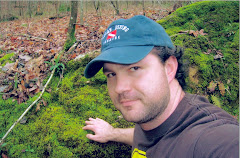I typically don't write or forward a review on a book I haven't read. It is certainly not my custom to pass on a book review written by someone I don't know. However, this book was recommended to me 2 weeks ago by a dear Brother and I found this review on the website of the ministry through which he serves, Mission Alive. I can't wait to read this book and I am so anxious to do so that I also want to put the info out there on this book so others can join me. Enjoy.
Hobby Chapin is a church planter in Denver, CO at Higher Point. He shares with us his take on The Tangible Kingdom.
Hugh Halter and Matt Smay are practitioners in missional-incarnational church planting. The Tangible Kingdom is a platform for Hugh and Matt to share their stories in church planting and to extract the missional-incarnational principles from their experience.
The authors speak from the heart in addressing the tension that is present for those transitioning from traditional church paradigms toward missional-incarnational ones. Their goal is to show that the Kingdom becomes real in people’s lives when they have the right elements interacting. These elements are communion, mission, and community.
• Missional-Incarnational communities must have a deep sense of communion with God. Both on an individual and a communal level, there must be disciplines that are aimed at spiritual formation and “being” in God’s presence.
• Missional-Incarnational communities must have a deep sense of participation within God’s mission. The term “missional” indicates being sent; the term “incarnational” indicates how we are sent out into the world to live among people for the purpose of engagement. Therefore, there must be disciplines of engagement with the world.
• Missional-Incarnational communities must have a deep sense of life together—that is, community. These communities practice disciplines of togetherness as they live out a shared story in God’s life. God’s calling and sending draws them together and form deep bonds.
Without these three elements, Christian community remains deficient and the Kingdom of God distant.
The transition toward practicing missional-incarnational principles can be messy and confusing. Hugh and Matt are pioneers plowing ahead and coaching others along the journey. For those who have read many books on missional theology or missional church planting, The Tangible Kingdom provides many similar bits of information and insights. What separates the Tangible Kingdom from many others is the candid story-telling of the authors and their insight as practitioners. For those of you who have taken the plunge into this journey of practice, there will be many relatable moments with sharpening nuance.
One of the greatest strengths of this book is that it will pose a challenge that will confront tendencies to sit and talk about these principles or to abandon them along the journey for “what works.” Missional-Incarnational practitioners are defined by their “being” in the presence of God and their willingness to “do” as God sends them to participate with Him in the world. That takes leaders out into the world rubbing shoulder to shoulder with those sojourners who are willing to journey with them. This requires consistency and intentionality. I appreciate Hugh and Matt for their candid leadership and for their sharp challenge to get on and stay the course.
*Halter, Hugh and Matt Smay. The Tangible Kingdom: Creating Incarnational Community; The Posture and Practices of Ancient Church Now. Jossey-Bass: San Francisco, 2008.
Subscribe to:
Post Comments (Atom)



No comments:
Post a Comment